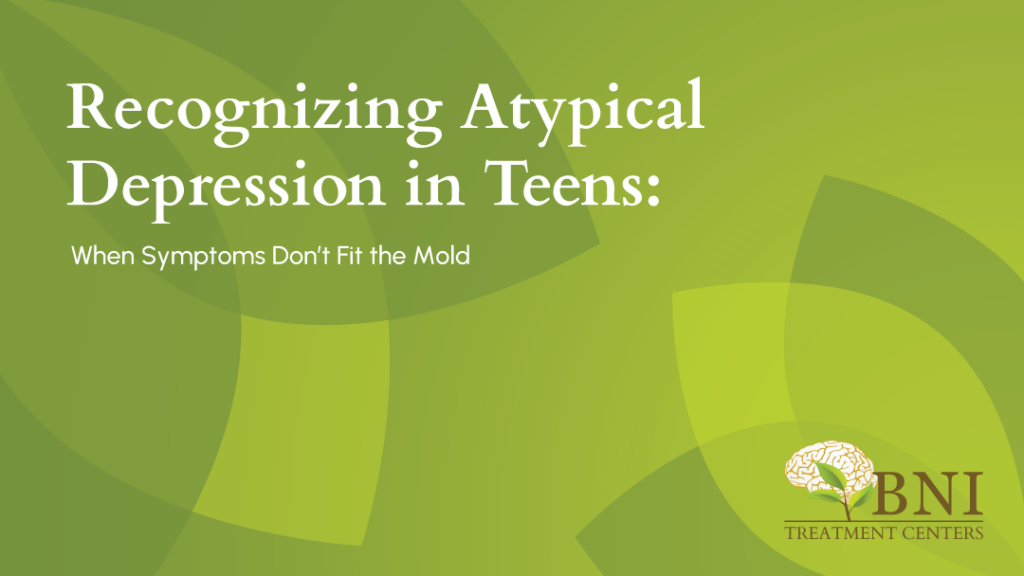
396,000 California teens had depression in 2021. That’s more than the entire population of Anaheim.
That number is likely higher, too, because many teens with depression go undiagnosed. This is due in part to atypical depression, which presents differently and less obviously than “typical” depression.
What is atypical depression, and how can you recognize it in teens? We work with teens whose depression manifests in a variety of ways at BNI Treatment Centers. We’ll share what we’ve learned.
Understanding Atypical Depression: What Makes It Different From Traditional Depression?
The American Psychiatric Association once considered atypical depression its own condition. Now, it is just a variation of major depressive disorder, known as “major depression with atypical features.”
Despite its name, it isn’t uncommon – an estimated 15%-36% of people with depression experience atypical features.
Individuals with atypical depression may experience a better mood based on what happens around them. This is unlikely in those with traditional depression. A teen with atypical depression may feel less depressed when they receive a high grade on a test. One with traditional depression is unlikely to feel any relief from their symptoms in the same situation. There are also additional symptoms unique to atypical depression.
Signs and Symptoms of Atypical Depression to Look for in Your Teen
The symptoms of atypical depression are largely the same as traditional depression. These signs include:
- Loss of enjoyment in hobbies
- Persistent feelings of sadness, hopelessness, worthlessness, and/or guilt
- Sleep disturbances
- Fatigue
- Trouble with memory and concentration
- Suicidal ideation
However, atypical depression comes with a few unique symptoms:
- Mood that increases due to certain events
- Hypersomnia (sleeping too much)
- Increased appetite and weight gain
- A physical and mental feeling of heaviness
- Sensitivity to criticism and rejection
It’s important to note that some symptoms of atypical depression are shared with physical health conditions, such as thyroid complications. If you think your teen has atypical depression, it’s important to take them to a doctor. They can rule out any other health conditions, and likely provide a referral to a mental health provider for a potential depression diagnosis.

The Suspected Causes of Atypical Depression
We are still learning about the causes of atypical depression.
Both traditional and atypical depression are linked to dysfunction in the organs responsible for regulating the body’s stress response. However, one of the key hormones involved in the process is higher in those with atypical depression, and lower in those with nonatypical depression. Whether this causes atypical depression or is a result of atypical depression is unclear.
Genetics are thought to be a factor. This is the case with traditional depression as well, but atypical depression is genetically distinct from it. It still is more likely to manifest in an individual with a family history of atypical depression.
It also commonly occurs alongside bipolar disorder and is more likely in women than men.
Other potential causes of atypical depression are:
- Trauma
- Chronic stress
- Serious illnesses
- Substance misuse
Providing Support: How to Help Your Teen With Atypical Depression
If you believe your teen has atypical depression, the best thing you can do is bring them to a doctor first. Then, get them to a mental health professional. This is the only way for them to receive a potential diagnosis and treatment.
Habits like getting healthy sleep, eating nutritious meals, and exercising regularly also help with depression. Speak to your teen’s doctor about any supplements that may help, though this must be coordinated with any psychiatric medication they take. Some supplements and medications interact with one another.
You can also help your teen by learning more about atypical depression and talking about it openly. Work to create a safe environment for your teen to share their feelings and concerns, and listen without judgment when they do. Remember that their depression is not their fault, and it’s important to ensure they never feel that it is.
Check in on how they’re doing regularly. If they’re having trouble managing chores and other responsibilities, offer to help while still encouraging them to do tasks themselves when they can. Remain as patient as possible. Atypical depression can be frustrating as a parent, but keep in mind that your teen is equally frustrated experiencing it.

Treatment for Teen Atypical Depression in Los Angeles
Any adolescent can recover from depression with teen depression treatment – even if that depression has atypical features. It may be lesser-known than traditional forms of depression, but plenty of mental health experts are available and ready to provide the care your child needs.
BNI Treatment Centers provides mental health services to youth ages 12-17 in the Los Angeles area. Our facilities are owned and operated by expert clinicians, including psychiatrists who are intimately involved in every adolescent’s treatment plan. Their care will be customized to them and their needs, and it can be adjusted quickly based on effectiveness. No condition is too complex for us to treat or diagnose. If your adolescent needs help, we encourage you to call (888) 522-1504. We’ll support your family every step of the way.
BNI Treatment Centers: Science-based, evidence-backed, compassion-led.




